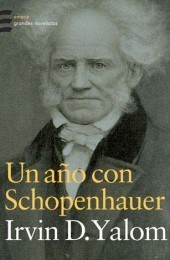What do you think?
Rate this book


304 pages, Paperback
First published June 4, 2005


" عاش شوبنهاور، وظل يبدي مظاهر الاكتفاء الذاتي الشخصي . وظل مثابراً في عمله ،وظل فيلسوفاً منتجاً حتى نهاية حياته، ولم يفقد ثقته بنفسه قط. وشبه نفسه بشجرة بلوط صغيرة تبدو عادية وغير هامة بالنسبة للنباتات الأخرى. 《لكن أتركه وحده ، فلن يموت. سيأتي الزمن الذي يجلب معه الذين يعرفون قيمته بحق. 》 وتنبأ بأنه سيكون لعبقريته في نهاية المطاف، تأثير عظيم على الأجيال المقبلة من المفكرين . وكان محقاً في ذلك تماماً ، فقد حدث ما تنبأ به "


" إن الطبيعة منحته مزاجاً قلقاً ، وشعوراً بالريبة والشك، وحساسية شديدة ، وحدة في المزاج ، وإحساساً بالفخر إلى درجة لا تكاد ترقي إلى رصانة فيلسوف .
لقد ورثت من أبي القلق الذي ألعنه أنا نفسي وأحاربه بكل ما أوتيت من قوة إرادتي "





" شوبنهاور ، كان أول فيلسوف ينظر إلى الدوافع والمشاعر من الداخل ، وطوال فترة عمله كتب باستفاضة عن المخاوف والشواغل الإنسانية الداخلية : الجنس ، الحب ، الموت ، الأحلام، المعاناة، الدين ، الانتحار ، العلاقات مع الآخرين، الزهو ، تقدير الذات. وتطرق أكثر من أى فيلسوف آخر إلى تلك الدوافع المظلمة في داخلنا إلى حد أننا لا نستطيع تحمل أن نعرفها، لذلك، يتعين علينا كبتها "
" قد نكون بحاجة إلى نوع مختلف من العلاج وإلى نوع مختلف من الفلسفة لمختلف الأمزجة، منهج للذين يحبون أن يكونوا قريبين من الآخرين ومنهج آخر للذين يختارون سلوك حياة العقل "
”Imagine an ancient city that built a high wall to protect it from the high torrents of an adjacent river. Centuries later, though the river had long dried up, the city still invested considerable resources in maintaining that wall." (about human-beings and their self-defense systems)Most of the times we perceive our own actions as the exact expression of our desires. How often is it really so? Sometimes consciousness plays tricks on us and what we perceive as true might only be a mental disguise for something deeply hidden inside our minds. We think people are how we see them: sometimes cruel, not interesting or boring, but we forget that what we see is not what it’s really out there, but a distorted version of reality filtered by our own moods, passions, suffering, ideals (Kant).
This book explores how psychoanalysis and group therapy can contribute to the understanding of our actions and torments. It digs for the roots of unhappiness in certain individuals who have problems dealing with their relationships because their controversial actions are empowered by hidden psychological sufferings. The characters can be seen as prototypes of certain psychological afflictions: a beautiful woman whose relations with other people are heavily influenced by her unquenchable thirst to be admired, a woman that cannot get past her rage and destroys all the relationships she has with men, a sexually-addicted person that cannot relate to other human beings etc. and they become aware of their hidden motives only through discussions with the other members of the group during therapy sessions.
Rene Magritte - The Glass House